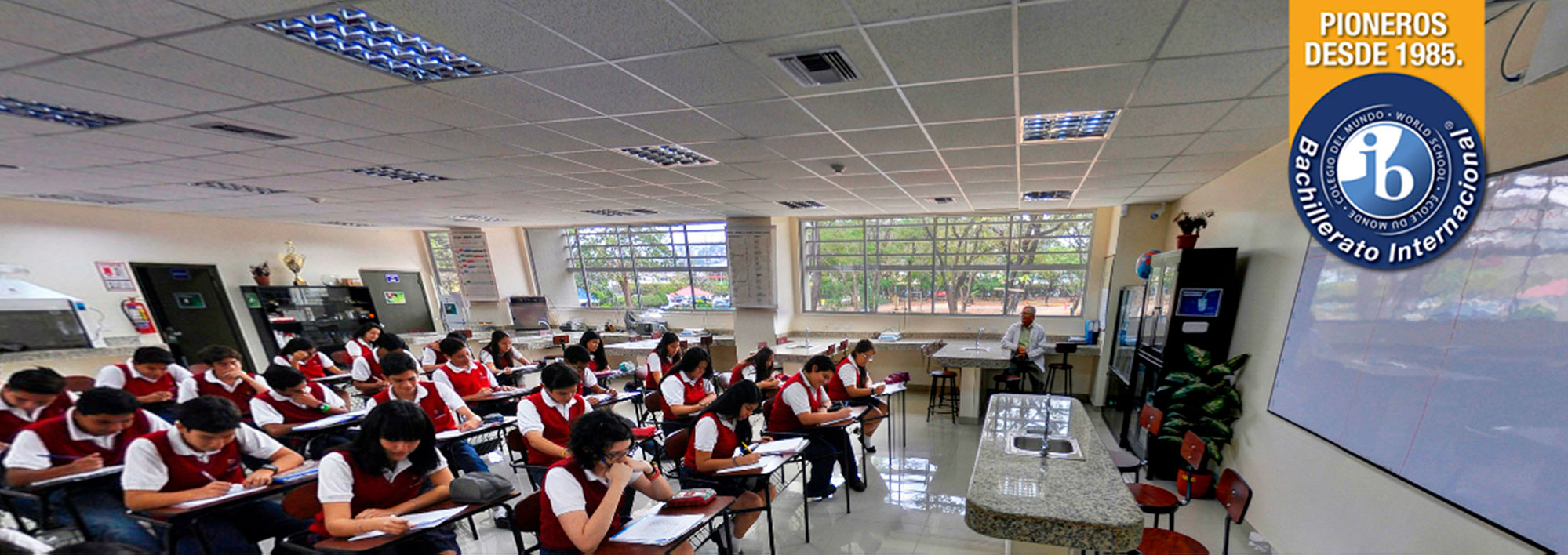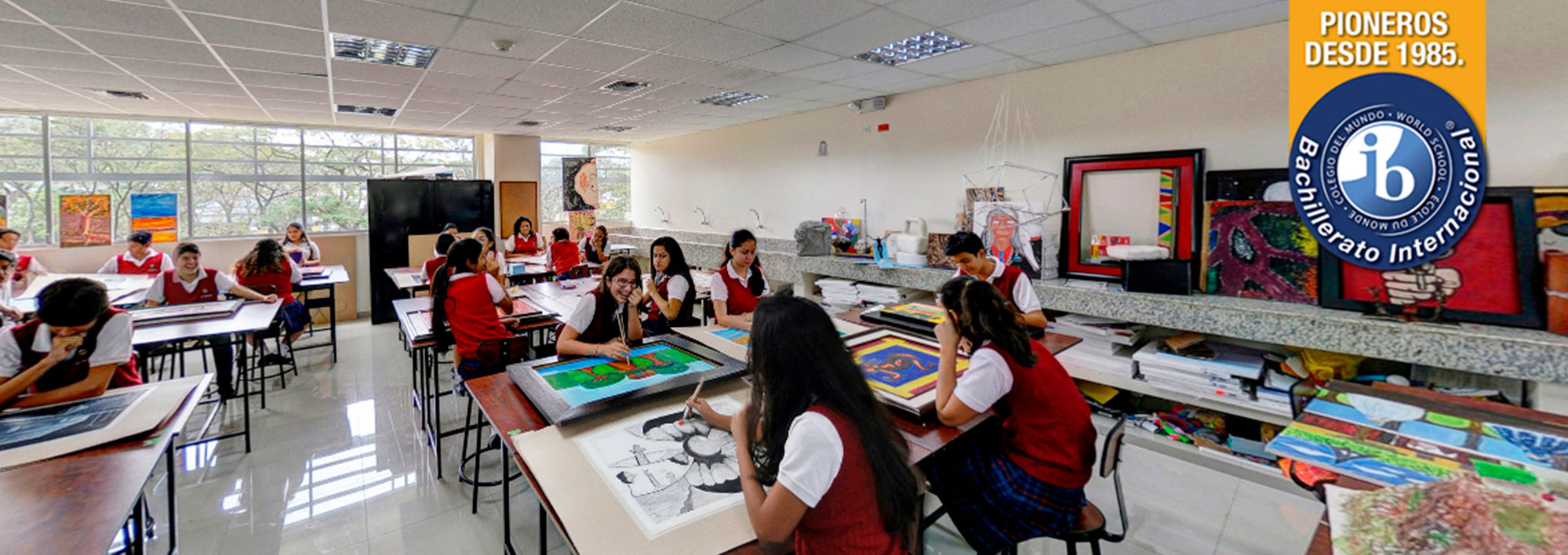IB GENERAL
The academic programme, International Baccalaureate(IB) Diploma, is a broad based two year plan of rigorous academic content leading to final examinations for students between 16 and 19 years of age. As its name implies, it is an international programme and does not follow the traditional Ecuadorian academic system.
The general objectives of the program include providing a balanced, integrated education which will lead students to have a more complete global vision.
IB has become a symbol of intellectual capacity, achievement, academic integrity and a solid base for future university study and beyond. This base is formed through a dedication to learning, skill development, and discipline. IB graduates have the skills necessary to study anywhere in the world upon completion of the program.
Colegio Americano has been a member school of International Baccalaureate (IB) since 1986. It was the first IB school in the coastal region of Ecuador and one of the first in the entire country. Given Colegio Americano´s status as an early adaptor, over time the school has provided assistance and guidance to other Ecuadorian schools during their transitions into becoming IB schools.
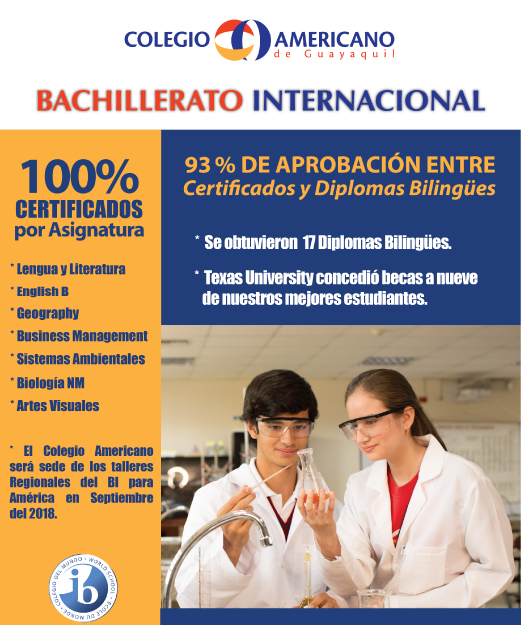
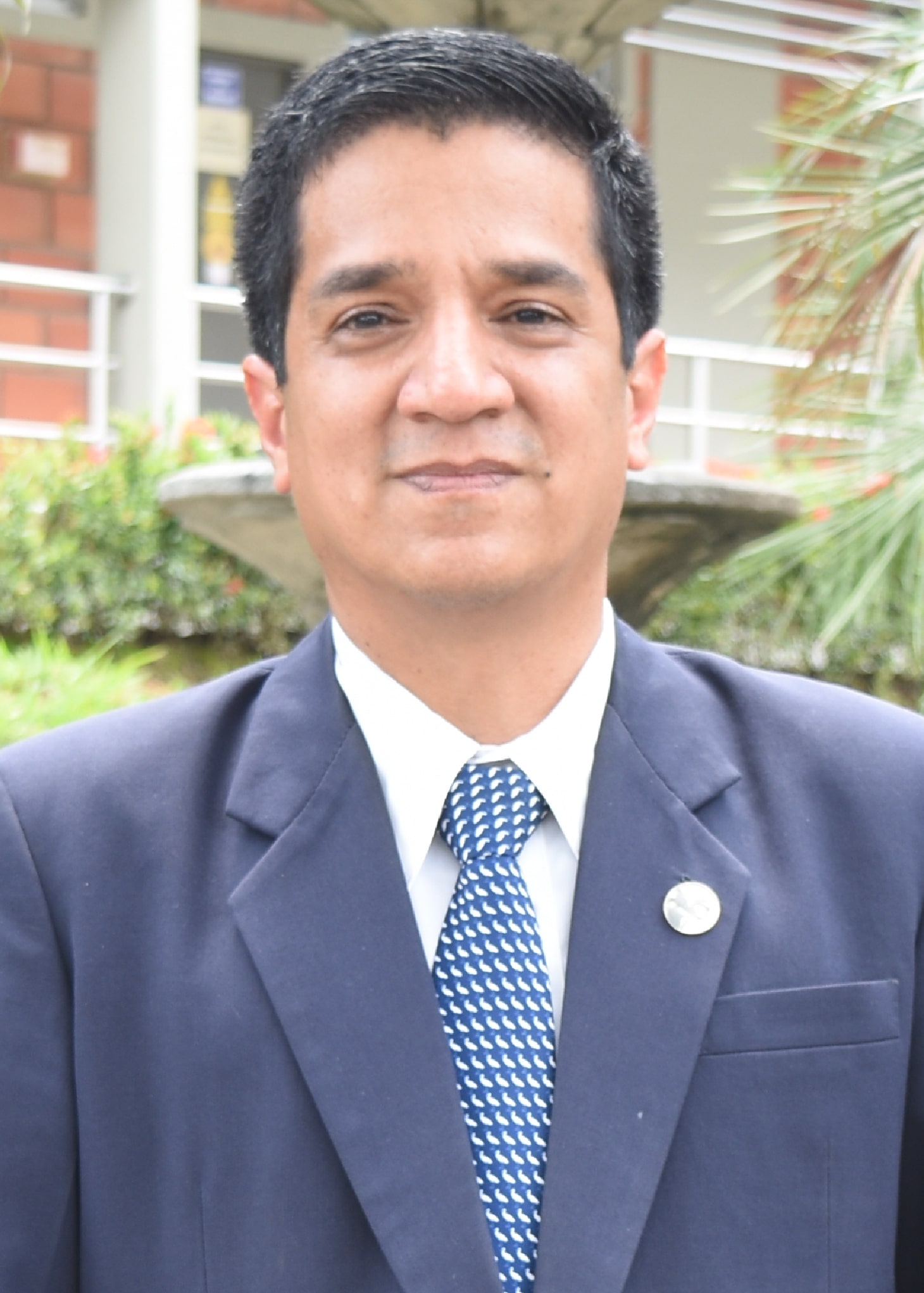
Ing. Whymper León Kuffo, MBA
International Baccalaureate Coordinator
ADDITIONAL INFORMATION
For more information please visit http://www.ibo.org/ or contact MBA. Whymper León.
International Baccalaureate Director.
whymper.leon@colegioamericano.edu.ec
DIPLOMA VS CERTIFICATE
Students may select between one and six subjects at the IB level. If they decide to complete the full Diploma Programme (DP), they take six subjects total; 3 or 4 subjects are studied at Higher Level and the remainder at Standard Level. One subject must be chosen from each group from Groups 1–5 and a sixth subject may be chosen from groups 3, 4, or, 6. Each student must also fulfill 3 further requirements: CAS, TOK, and Extended Essay.
Historically around 25% of students choose to attempt the full Diploma Programme while the others choose to pursue 3 certificates on average.
– The Extended Essay is a 4,000 word essay written in an IB subject (selected by the student) which provides an opportunity to conduct independent research or investigation on a topic that interests them.
– Theory of Knowledge is a class that investigates the nature and scope of knowledge. Put concisely, it is the study of knowledge and justified belief. It questions what knowledge is and how it can be acquired, and the extent to which knowledge pertinent to any given subject or entity can be acquired.
– CAS is another essential part of the IB Diploma Programme. It provides students with an opportunity to learn through the experience of helping others. The possibilities for CAS projects are almost limitless but all have the same desired outcomes. The students should Increase awareness of their strengths and areas for growth, undertake new challenges, plan and initiate activities, work collaboratively with others, show perseverance and commitment, engage with issues of global importance, consider ethical implications, and develop new skills.
Further benefits attained by students with IB Diplomas are the advantages given by universities around the world such as scholarships, admission to the university without entrance examinations, among others.
IB CURRICULUM
The IB curriculum is often represented as a circle, with Theory of Knowledge (TOK), Extended Essay and Creativity, Activity, Service (CAS) at its core.
Each of the six academic subjects is graded on a scale of 1–7, with 7 being the highest grade. TOK and Extended essay are graded from A-E. Students must receive at least a D in each of these subjects and score 24 total points for subjects in groups 1-5 (12 in High Level subjects) to earn the IB Diploma. TOK and the Extended Essay provide a further 3 points, giving a potential maximum score of 45 points. CAS must also be completed, but provides no points.
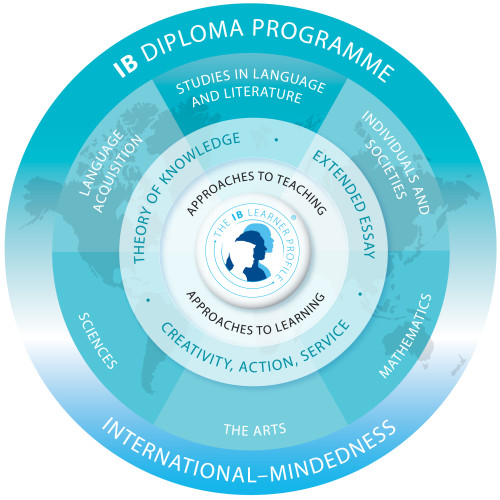
| GRUPO | CIENCIAS | EMPRESARIALES | SOCIALES |
| Grupo 1 | Lengua y Literatura (NS) (Profesores: Williams Sánchez – Guisella Vulgarín ) | Lengua y Literatura (NS) (Profesores: Williams Sánchez – Guisella Vulgarín ) | Lengua y Literatura (NS) (Profesores: Williams Sánchez – Guisella Vulgarín ) |
| Grupo 2 | English B (HL) (Teachers: Kathleen McGill – Sonnia Mite) | English B (HL) (Teachers: Kathleen McGill – Sonnia Mite) | English B (HL) (Teachers: Kathleen McGill – Sonnia Mite) |
| Grupo 3 | History (SL and HL) (Teachers: Pia Aycart, Jonathan Lucero) | History (SL and HL) (Teachers: Pia Aycart, Jonathan Lucero) Economía (NM y NS) (Profesor: Carlos Pazmiño) Business and Management (HL) (Teachers: Whymper León, Alex Arancibia) | History (SL and HL) (Teachers: Pia Aycart, Jonathan Lucero) Global Politics (SL) (Teacher: Kathleen McGill) |
| Grupo 4 | Biología (NM y NS) (Profesor: Mariuxi Bonilla) Física (NM y NS) (Profesor: Flavio Arguello) Química (NM y NS) (Profesor: Sofía Recalde) | Sistemas Ambientales (NM) (Profesor: Angie Coello) | Sistemas Ambientales (NM) (Profesor: Angie Coello) |
| Grupo 5 | Matemáticas: Análisis y Enfoques (NM) (Profesor: Leonardo Maya) Matemáticas: Aplicaciones e Interpretación (NM) (Profesor: Jordy Salgado) | Matemáticas: Análisis y Enfoques (NM) (Profesor: Leonardo Maya) Matemáticas: Aplicaciones e Interpretación (NM) (Profesor: Jordy Salgado) | Matemáticas: Análisis y Enfoques (NM) (Profesor: Leonardo Maya) Matemáticas: Aplicaciones e Interpretación (NM) (Profesor: Jordy Salgado) |
| Grupo 6 | Artes Visuales (NM y NS) (Profesor: Lenin Muñoz) | ||
| All Students | Teoría del Conocimiento (Profesor: Jonathan Lucero) Creatividad, Acción y Servicio (Profesor: Jonathan Lucero) | Teoría del Conocimiento (Profesor: Jonathan Lucero) Creatividad, Acción y Servicio (Profesor: Jonathan Lucero) | Teoría del Conocimiento (Profesor: Jonathan Lucero) Creatividad, Acción y Servicio (Profesor: Jonathan Lucero) |
IB EVALUATION
IB students are evaluated in a number of ways throughout the two-year program. The culmination of the program takes place in November of the final year when the students take their IB exams. Before the exams, the students complete a number of evaluative activities such as laboratories, essays, investigations, oral commentaries, and text related commentaries.
ACADEMIC HONESTY
The IB as well as Colegio Americano de Guayaquil expects all students to follow a strict academic honesty code. This code has been developed by various members of the teaching and administrative staff and will be applied vigorously toward any student found to be in violation of the code.
Some common examples of malpractice are:
1.- Plagiarism
2.- Collusion
3.- Duplication of work
4.- Misuse of technology during evaluations
All students are encouraged to consult with their teachers regarding any academic honesty issues. A copy of the academic honesty policy can be found here: https://www.ibo.org/globalassets/digital-toolkit/brochures/academic-honesty-ib-en.pdf
IB LEARNER PROFILE
All IB students strive to be the following:
1.- Inquirers: The IB nurtures student curiosity, developing skills for inquiry and research.
2.- Knowledgeable: The IB teaches students to develop and use conceptual understanding, exploring knowledge across a range of disciplines.
3.- Thinkers: IB students use critical and creative thinking skills to analyze and take responsible action on complex problems.
4.- Communicators: IB students express themselves confidently and creatively in more than one language and in many ways.
5.- Principled: IB students act with integrity and honesty, with a strong sense of fairness and justice, and with respect for the dignity and rights of people everywhere.
6.- Open-Minded: IB students appreciate their own cultures and personal histories, as well as the values and traditions of others.
7.- Caring: IB students show empathy, compassion, and respect. They have a commitment to service, and they act to make a positive difference in the lives of others in the around them.
8.- Risk-Takers: IB students approach uncertainty with forethought and determination; they work independently and cooperatively to explore new ideas and innovative strategies.
9.- Balanced: IB students understand the importance of balancing different aspects of their lives-intellectual, physical, and emotional-to achieve well-being for themselves and others.
10.- Reflective: IB students thoughtfully consider the world and their own ideas and experience. They work to understand their strengths and weaknesses in order to support their learning and personal development.

